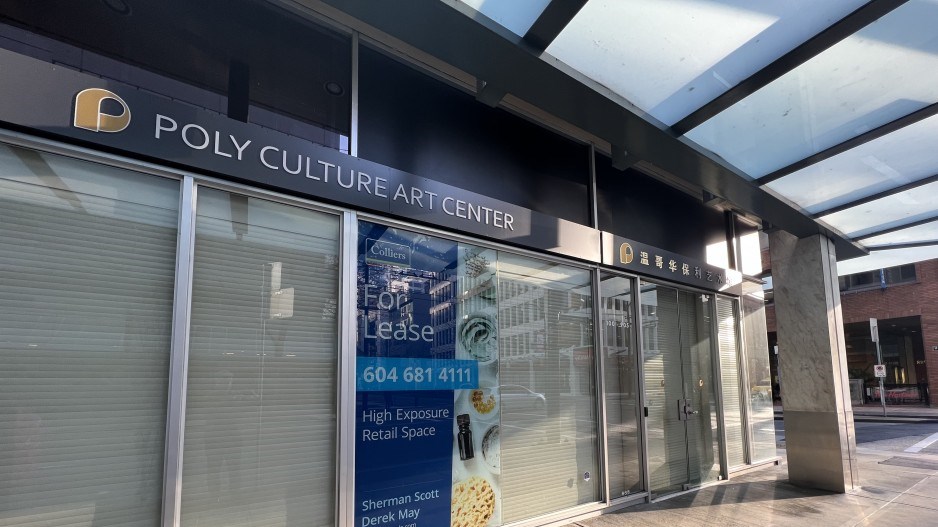A subsidiary of China Poly Group, one of China’s biggest state-owned enterprises, has quietly closed its North American office in Richmond and art gallery in downtown Vancouver.
Gallery and theatre manager and art auctioneer Poly Culture North America launched to great fanfare more than six years ago, before pandemic, economic and geopolitical headwinds.
In late February, Colliers Canada agents Sherman Scott and Derek May listed the shuttered Poly Culture Art Center for lease. The vacant 4,117-squarefoot location on street level at the northwest corner of West Pender and Hornby is marketed as a “high exposure retail space.”
Poly Culture also vacated its seventh-floor office at Richmond Place, east of Richmond city hall, at the end of last November, according to leasing agent Jeff Toews of Warrington PCI Development.
Poly Culture’s local phone numbers are out of service, its website set to maintenance mode and its WeChat account has been inactive since early January.
Jiang Yingchun, Poly Culture’s vice-chair and a director of the B.C. subsidiary, did not respond to an email query before publication.
The Richmond business licence for Poly Culture North America Investment Corp. Ltd., incorporated in January 2015, said it employed 12 people full-time in the categories of investment company, management services and culture information exchange.
Poly Culture received an unspecified amount under the Canada Emergency Wage Subsidy job-saving program during the height of the pandemic.
The organization originally announced its transpacific expansion in fall 2015 under an agreement with HQ Vancouver that was signed during then-premier Christy Clark and former international trade minister Teresa Wat's trade mission to Beijing.
HQ Vancouver was a $6.5 million partnership between the federal Western Economic Diversification agency, B.C. Ministry of International Trade and Business Council of British Columbia to promote Vancouver as a destination for Asia-Pacific corporate expansion.
HQ Vancouver’s advisers included Dominic Barton, then global managing director of McKinsey and Co. The CEO was Yuen Pau Woo, who quit in 2016 when Prime Minister Justin Trudeau appointed him to represent B.C. in the Senate.
Poly Culture’s gallery launched Nov. 30, 2016 with an exhibit of bronze-cast animal heads originally from China’s Old Summer Palace, the same day the Poly-sponsored China Philharmonic Orchestra began its North American tour at the Chan Centre. Poly Culture also promoted the 12 Girls’ Band’s 2018 Lunar New Year celebration and collaborated on the Vancouver Symphony Orchestra’s Tan Dun: Crouching Tiger and Beyond concert in 2019.
During an interview before the 2016 grand opening, Jiang told BIV that Vancouver’s proximity to China, multicultural environment and favourable tax policies made it an attractive destination.
“We will hold exhibitions free of charge to the local communities every year,” Jiang said. “Those exhibitions include some of those from China. We will also hold exhibitions for the local artists and Aboriginal people, so we hope it will be a cultural exchange platform to boost the cultural exchange from both sides.”
Jiang also said that other divisions of the China Poly Group were eyeing Vancouver for expansion.
“For example, Poly Real Estate has sent people to come to visit Vancouver twice to know the environment here,” he said.
The gallery was also known for private hospitality events. By coincidence, the Canada-China Business Council’s cocktail party with China’s then Vancouver consul-general Tong Xiaoling was the same December 2018 night that a B.C. Supreme Court judge released Huawei executive Meng Wenzhou to live under curfew and electronic monitoring at her Shaughnessy mansion. Partygoers included former Liberal senator Jack Austin and former Conservative public safety and international trade minister Stockwell Day.
Tong’s Vancouver consulate posting ended last July, but she is in the news after leaked reports by Canada’s spy agency claimed that she meddled in both the 2021 federal election and Vancouver’s 2022 civic election.
The Land Owner Transparency Registry says the gallery landlords were Liu Shu of Vancouver, Zeng Chaolin of Shanghai and a November 2015-incorporated numbered company. The B.C.-registered Poly Culture subsidiary’s directors include Jiang, Chen Yi and Xing Mei of Richmond, and Guo Jianwei of Beijing.
China Poly Group originally began in 1984 as a People’s Liberation Army co-founded arms dealer. It now boasts 11 major subsidiaries, more than 2,000 wholly owned or controlled enterprises and 110,000 employees.
The Washington, D.C.-based Center for Advanced Defense Studies (C4DS) reported last year that it found evidence of almost 300 shipments of sensitive goods from Poly subsidiaries to Russian defence organizations between 2014 and 2022.
“Poly Group’s significant size and industry breadth comingles international weapons trade with consumer electronics, art, and antiquities, and more, which complicates efforts to isolate the companies involved in defence trade and limits the effectiveness of sanctions targeted at only one company within the broader group,” said the C4ADS Trade Secrets report on China-Russia military trade.

